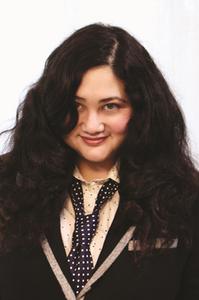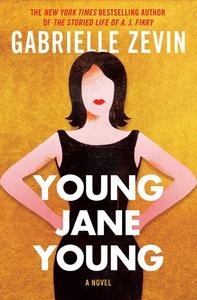
|
|
| photo: Hans Canosa | |
Gabrielle Zevin's eighth novel, The Storied Life of A.J. Fikry, spent more than four months on the New York Times bestseller list, reached #1 on the National Indie Bestseller list, and has been a bestseller around the world. She has also written books for children and young adults, including the award-winning Elsewhere. Her new novel, Young Jane Young (Algonquin Books), is the story of a congressional intern, Aviva, caught in a sex scandal several decades ago, and how she becomes Jane. It's reviewed below.
Your third novel for adults, The Storied Life of A.J. Fikry, was a wild success and a favorite of booksellers. Did you have any anxiety writing Young Jane Young?
If you are a professional in the arts, I think you become accustomed to a certain amount of anxiety when you're embarking on a new project, and this anxiety is key. Writing ought to feel a little dangerous. When I'm working on a book, I sometimes wake up in the middle of the night feeling sick about it: Do I really want to do this? Do I really want to go there? This was true of Young Jane Young, too. I felt uneasy during the whole last election season, and I think the book reflected that anxiety. I also felt that I wanted to tell this story right now.
But your question was about success-based anxiety, and no, I didn't particularly feel that. Young Jane Young is my fourth novel for adults, but I've also written five novels for young readers. Some of my books have done well commercially, some have done less well. Some of the commercial failures were, in my mind, artistic successes. I have practice failing so I'm not scared of failure. I haven't done an event in the last decade or so when someone hasn't told me how much they preferred one of my books over the others. Should I say that this used to hurt my feelings?
Jane is written in five voices (the young intern Aviva; event planner Jane; Aviva's mother, Rachel; Jane's daughter, Ruby; and Embeth, the congressman's wife). You make some interesting style and narrative choices, like Ruby's story told via letters to her pen pal; the "Choose Your Own Adventure" style for Aviva; third person for Embeth.
Ruby is incredibly lonely, and as many lonely people do, she is having an intimate relationship with someone she hasn't even met IRL. She is saying things she has never said to anyone. I liked writing a 13-year-old writing, which is different than a 13-year-old speaking or behaving or even a 13-year-old in first person. As I mentioned before, I've written books for young people, and their letters to me are so playful with language in a way that most adults are not playful; e.g., love of wordplay and typography.
Roger Ebert once called the movies "empathy machines," and I think books are empathy machines, too. I wanted to put the reader into Aviva's decision-making process. There is no point of view that is more intimate than the second person. I hoped that would give a reader greater empathy for what it is to be young, inexperienced and enthralled by someone more powerful than you.
Embeth was probably my favorite character to write, in third person, free indirect discourse. I apologize that I'm so nerdily talking about narrative point-of-view, but I actually love talking about and thinking about this subject. I love what point-of-view can do to a piece of writing--it's one of the most important decisions I make when I'm working on a book. Who is telling this story and how is it told? Anyway, I thought this point of view suited her dilemma as a politician's wife because it's more removed than the first-person accounts we get in the rest of the novel. You can speculate about Embeth; you can attempt to interpret her; you can know things about her, but you can never truly know her. In a way, I wanted the opposite effect of the Aviva "Choose" section. The Embeth section was inspired a bit by Mrs. Dalloway, which is also third, free indirect discourse.  El Metè, Embeth's probably-imaginary parrot, is a funny addition.
El Metè, Embeth's probably-imaginary parrot, is a funny addition.
Thanks for asking about the parrot! On some level, I feel like the parrot represents Embeth's marriage and her feelings about her husband. Sometimes, Embeth wishes she could be rid of El Metè. It's irritating and a burden to always have a parrot on your shoulder. But ultimately, Embeth would probably miss El Metè if he were gone.
I was obsessed with parrots when I was a kid. I wrote a research paper on them. I drew them all the time. (I still can draw a pretty good parrot.) I was an only child and loved the idea of having an animal I could speak to. I begged my parents to take me to a theme park/zoo called Parrot Jungle, so I could meet the object of my affection in life. But the reality of a parrot wasn't what I thought it would be. They were smelly and dirty. They spoke, yes, but nothing germane. When a parrot was placed on my arm, I remember the claws digging into me and how ridiculously heavy that parrot felt. I suppose the Embeth section, in part, draws on my childhood disillusionment with parrots.
Slut-shaming: for Jane, it comes up in her past when she was Aviva. What's the statute of limitations for mistakes made? Monica Lewinsky has had a very tough time of it.
With the Internet, there is no statute of limitations, is there? You can always Google something and everything comes up forever.
On some level, I find myself stunned that Monica Lewinsky is only 43. It points out how very young she was when the Clinton scandal happened. I read her New York Times piece on Roger Ailes a couple of months ago, and read the comments beneath it, too. Knowing this book would be published in a few months, I wanted to know how people were reacting to her all these years later. And, my God, the level of judgment was intense. She was a baby then. She made a mistake. President Clinton's mistake was worse--he was a grown man, a father, the leader of the free world. She was a dopey intern. Come on, people.
A funny comment that I read was from a woman who said she was a White House intern around the same time Monica Lewinsky was. She said that many of the women she worked with had great sympathy for Lewinsky. It could have been any one of them. President Clinton's charisma was so great that had he looked any of their directions, they could have been her.
There are people, by the way, who can't even bear a fictional woman who has made mistakes. I rarely post online, but I put up a post describing my new book and generally people said they were looking forward to it, but several people felt the need to say things like, "Aviva sure sounds like a dumb girl." It's funny because A.J. Fikry is also dumb, arguably dumber--he is running his business into the ground, for instance. Both characters have made huge life mistakes, and yet, I don't recall anyone ever feeling the need to tell me that A.J. was dumb.
Jane says she survived by refusing to feel shame. How does one do that?
We need to stop apologizing. Women are quicker than men to apologize for themselves. Do you remember when Hillary Clinton conceded? She led with an apology. Trust me, a Trump concession would not have begun with an apology.
Shame is internal, and the decision to feel shame is internal. However, shaming is externally imposed by society, and women are particularly susceptible to shaming. I know that as a woman I have some agency in whether and how I choose to participate in a culture that shames other women. I know I can challenge old-fashioned narratives that attempt to punish and disempower other women. That's what I hope Young Jane Young does, by the way. --Marilyn Dahl

